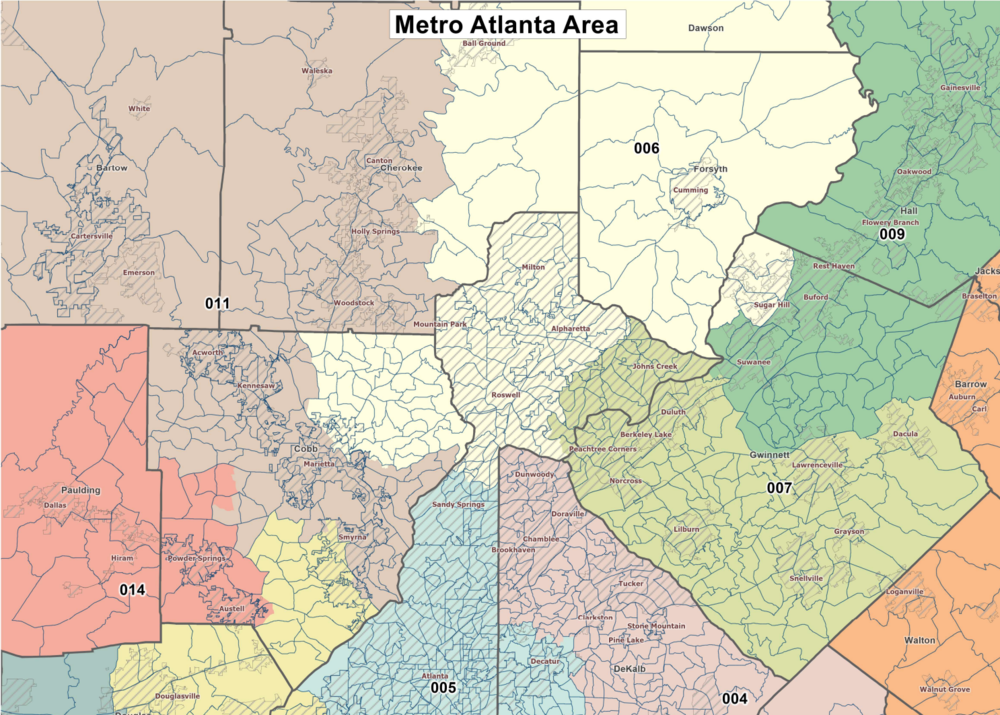
Caption
The likely new Congressional map in Georgia drastically alters the boundaries and partisan makeup of the 6th Congressional district.
|Updated: November 20, 2021 10:23 AM
The Georgia state Senate approved a new congressional district map along party lines. GPB's Stephen Fowler reports.

The likely new Congressional map in Georgia drastically alters the boundaries and partisan makeup of the 6th Congressional district.
The Republican-controlled Georgia state Senate approved a congressional map that turns the recently competitive 6th Congressional District currently held by a Democrat into one of the more conservative seats in the state.
On a 32-21 party-line vote, the Senate approved new boundaries for 14 congressional districts that will force some incumbent lawmakers to make difficult decisions about their reelection chances, starting with Rep. Lucy McBath in Atlanta's northern suburbs.
MORE: Georgia Republicans release a Congressional map, adding another likely GOP seat
Currently, her 6th District is a Democratic-leaning area that voted for President Joe Biden by about 12 points, but the new boundary lines swing 25 points to the right, where voters in the new district supported former President Donald Trump by about 15 points.
Republicans took the 6th from covering parts of Fulton, Cobb and DeKalb counties and morphed it to include heavily conservative areas of Cherokee, Forsyth and Dawson Counties. The new configuration would make it virtually impossible for McBath, first elected in 2018, to win reelection in that seat. Next door, the 7th Congressional District's boundaries were shrunk to include about half of Gwinnett County and most of Johns Creek, creating a Democratic stronghold.
McBath is likely to run in a primary against Rep. Carolyn Bourdeaux, who holds the 7th District seat.
"Now what bothers me about this redistricting process is that my Republican colleagues continue to target and discriminate against women of color," Sen. Gail Davenport (D-Jonesboro) said. "Just know that we will not be silent when you target women of color."
Democrats only hold 22 of 56 seats in the Senate and could not block passage of the bill, but during debate they assailed their GOP colleagues for both the timing and contents of the new redistricting plan.
"Redistricting in this way — drawing districts so contrived as to be ludicrous, to shore up power that is clearly fading — reads like a balding man trying to fool the world with an embarrassing combover," said Sen. Michelle Au (D-Johns Creek), whose new state senate district was redrawn to favor Republican voters. "No matter how hard you try, it's evident to everyone how desperately you're trying to hide what you've lost already."
Georgia has added more than 1 million people in the past decade, almost exclusively through a growing nonwhite population and concentrated in metro Atlanta. Overall, the maps crafted by Republicans did add more opportunities for Democrats to take more seats at the state legislative level — creating two new Senate districts in Democratic areas and about five new House seats.
Elsewhere on the map, Northeast Georgia Rep. Andrew Clyde must decide if he will run for reelection in the 9th District he currently represents or the 10th, into which his home county is now drawn into. Lawmakers are not required to live in the district they represent.